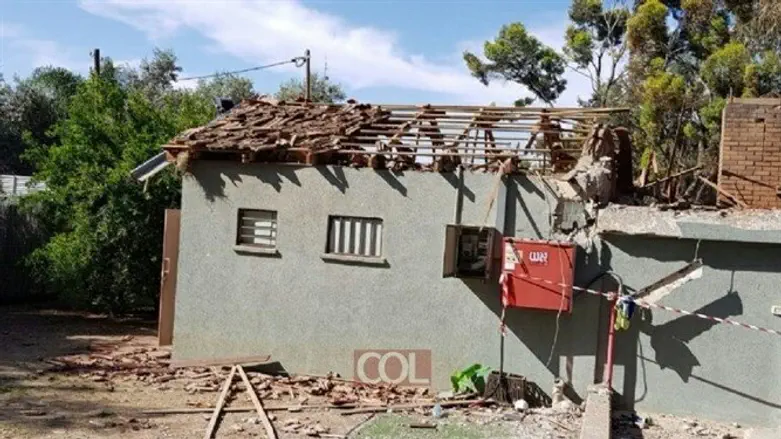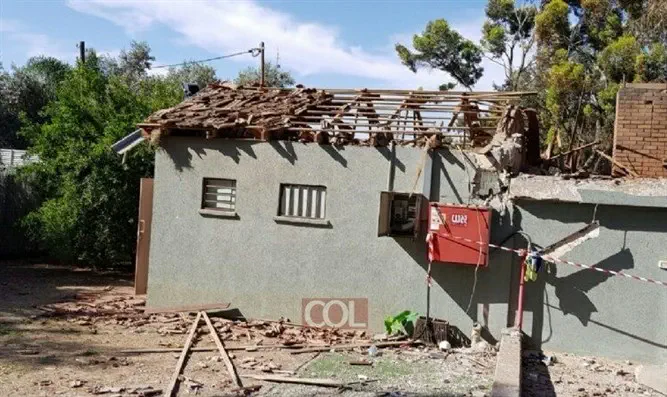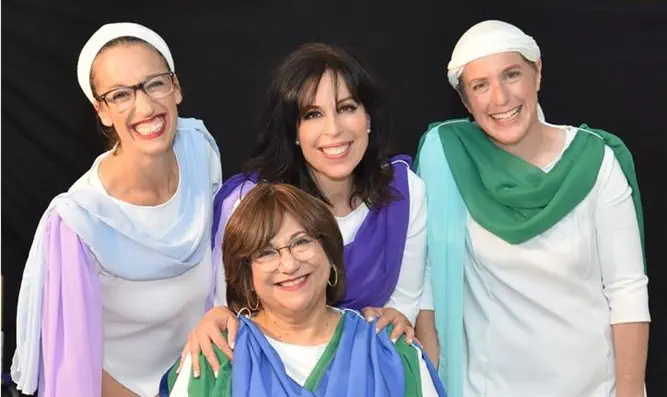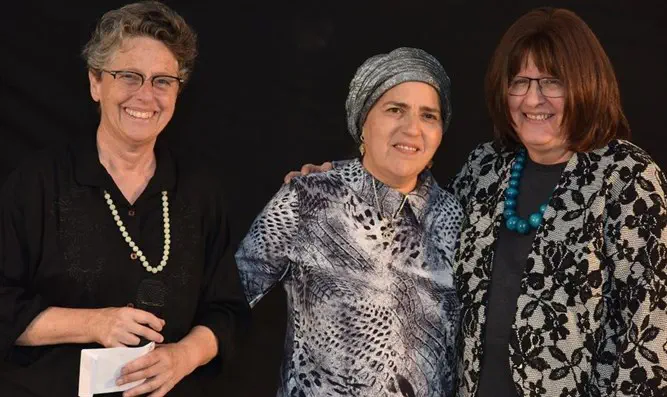
“Oh, G-d and His mysterious ways.” is a line that appears in one of the monologues in the show “Mikva the Musical, Music and Monologues from the Deep.” It is also the way Toby Klein Greenwald, the show’s co-creator, together with Myra Gutterman, describes how the troupe came to travel to Kiryat Gat, on the northern cusp of the Negev, to perform their acclaimed educational musical.
"MIkva," a play in English for women only, has been making waves in Israel, and even in landlocked Kiryat Gat.
It all began in May when Kiryat Gat was among the communities bombarded by Hamas rockets from Gaza early that month. On Saturday night, May 4, one of those rockets exploded through the roof of a Chabad mikva in Kiryat Gat. Miraculously, Esther Yifrach, the balanit (mikva attendant), was less than a minute away from the mikva and remained unscathed, but she witnessed the explosion and desecration. The roof and part of the inside of the mikva were severely damaged.

The Mikva Musical theater troupe decided to do what they could to help.
Greenwald told Arutz Sheva, “There was a strange string of events that led up to this. We were originally scheduled to perform in a different location on June 3 and that didn’t work out, and two more locations were offered to us but there were scheduling conflicts with other events in those communities. June 3 was the only date in early summer that everyone in our cast and crew were available to perform, in between trips abroad and their other projects.
“I watched the news on May 4 and saw the severely damaged mikva in Kiryat Gat, and suggested to Myra that we do a benefit show there. Our whole cast and crew said, ‘We’re in!’ I called Esther Yifrach, the balanit (mikva attendant) of the mikva, and she was over the moon to hear about what we were planning. It was miraculous that nobody was injured by the rocket attack, she said, though she is still dealing with the post-attack trauma.
Esther told Greenwald that another miracle was that, for the first time in her memory, there were no women waiting for her in close proximity to the mikva, who, like her, would have been severely injured or killed had they been there.
“We were very excited at the idea of bringing some joy to the women in that community and from the surrounding communities down south. I felt it was like a sign from G-d, saying, ‘I don’t need you to perform in those other towns, right now. I want you down in Kiryat Gat.’”
And so they went.
One of the challenges for the troupe is that Michele Gray Thaler, an actress who is disabled, is part of the caset and she – unlike the other actresses who perform the monologues of other women – delivers her own deeply inspiring stories to the audience. Every rehearsal or performance space must be wheelchair-accessible. Greenwald has the harrowing task of scouting for those spaces, and they were fortunate that the recently established JET Venues in Jerusalem gave them a generous discount in order to accommodate Michele.
Michele, by the way, has also created a dance troupe of women in wheelchairs who perform together with standing partners. In spite of her challenges, one of Michele’s monologues is the funniest in the show.
Through additional networking, Gutterman, through a friend, obtained the performance hall in Kiryat Gat, which was donated by Mercaz Maaleh (no connection to the Maale film school), thanks to the blessing given to the project by Rav Itzik Havlin, the rav of the Chabad yeshiva in Kiryat Gat, and his father, Rav Moshe Havlin, the chief rabbi of Kiryat Gat.
The evening was an exciting and emotional one. Women came not only from Kiryat Gat, but also from Even Shmuel, Netzer Hazani, Beer Sheva, Yad Binyamin, Shomria and all over the Negev. There were tourists from Capetown and Johannesburg and Cleveland and New York who made the trip down south to see the show and to express solidarity with the women there.
Each performance is followed by a discussion. Among the stories shared by the women in this audience were about going to the mikva on a Friday night without anyone knowing (due to a desire for modesty), the story of a Chabad rebbetzin living in Wyoming and driving to a mikva in Montana, two sisters discovering at an adult age that their mother’s monthly “card game,” at a particular location, was really something else, and Rebbetzin Mechi Fendel describing what it is like to live in Sederot and have only 15 seconds to run to the protected room when a rocket is coming in.
Anita Tucker, of Netzer Hazani, called the show, “Great, hysterical, very touching and wonderful musical entertainment.”
Channah Males Appel, Project coordinator at AISH, Cleveland, Ohio, said, “I’m a kalla teacher… and I’ve dealt with many situations of women who have gone to the mikva, older women, younger women…and this show was amazing, and highlighted so many aspects of the experience. It’s a must see for everyone.”
A lady from Johannesburg said, “I just want to say to whoever is involved in this fantastic show, that this show has demystified [mikva] and made it so normal, we all creep around on a Friday night and make excuses... because there is a privacy about it, as we know it should be, but you've made it such a happy, positive, shared experience that bonds us, and your voices are just unbelievable, and you shine...and Michele, I think you are so brave, to tell your story and to put your challenges out there, it's so inspiring...”
Another audience member said, “This is really fabulous and special and it's wonderful if you are able to get it around the world. Your story about taking the mother and mother-in-law to the mikva -- as a ba'alat teshuva, I also took my mother to the mikva.”
Across the ocean
Speaking of around the world, the week of June 23-27, the little troupe of Mikva the Musical, will strike out for new shores. Two dedicated patrons, Penina Popack and Henya Storch, have been working day and night to facilitate performances of Mikva in the greater New York area. As in Israel, part of the challenge has been finding performance venues and home hospitality that is accessible, but a way was found to do it all..
The troupe will perform in Queens, the 5 Towns, the National Opera Center in Manhattan (two matinees), and Teaneck, New Jersey. All the information about locations and tickets is on their website – www.MikvatheMusical.com. Another sponsor is Myrna Zisman. Joy Glicker Lieber of Cedarhurst, NY, owner of Bridal Secrets in Cedarhurst, donated funds for new costumes, that were sewn by Dena B. Davies of Jerusalem and other seamstresses. Many sisters helping many sisters.
Some members of the troupe will also be presenting lectures or workshops in two Shabbatonim, the first in Crown Heights, the second in Passaic, New Jersey. They will be giving sessions on the healing power of music and theater, mindfulness, theater midrash, and teaching swimming to special needs children and adults (a specialty of Gutterman).
Going the distance
The Mikva project began 13 years ago when Gutterman recorded stories from some friends and mikva ladies that she hoped to produce as a show called “The Mikva Monologues.” She asked Greenwald, an award-winning theater director and journalist, to join her early on in expanding it and developing it for the stage. About three years ago they morphed it into “Mikva the Musical” and since then it has sprouted wings that are taking them farther than they imagined. Read about the play itself here.



